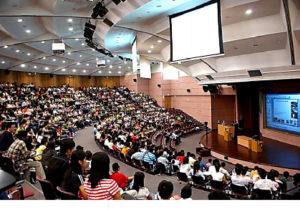Real Economies, Faux Economics and the Destruction of Universities
Geoff Davies

This year’s Nobel prize in economics spotlights a core deficiency in mainstream ‘neoclassical’ economics, one of many. It is pseudo-science. It needs to be banished from government, universities and our thinking. Defensible alternatives are available, but marginalised.
The prize was awarded for showing that higher pay can increase employment. This is a direct contradiction of the simplistic ‘law’ of supply and demand, a core concept of the dominant ‘neoclassical’ school of economics.
Supposedly, if the price of cabbages increases then fewer cabbages will be purchased. Similarly, if the price of hiring someone goes up, then fewer people will be hired. Well, not always.
There are some important differences between a produce market and the so-called ‘labour market’. One is that ‘labour’ comes with a person attached. Another is that a person can spend money whereas a cabbage cannot.
 One of the Nobel winners, David Card, and his colleague the late Alan Krueger showed in 1993 that a rise in the minimum wage in New Jersey was accompanied by an increase in employment, with neighbouring Pennsylvania as a control. The inferred reason was that there was more money circulating.
One of the Nobel winners, David Card, and his colleague the late Alan Krueger showed in 1993 that a rise in the minimum wage in New Jersey was accompanied by an increase in employment, with neighbouring Pennsylvania as a control. The inferred reason was that there was more money circulating.
Not only their result but their approach was novel. They used observations of the real world. Most neoclassical economists just start with the standard assumptions and do some more mathematical deduction.
The response of the neoclassical establishment was hostile. For example fellow Nobelist James Buchanan said
“Such a claim, if seriously advanced, becomes equivalent to a denial that there is even minimal scientific content in economics, and that, in consequence, economists can do nothing but write as advocates for ideological interests.”
Buchanan was correct: there is no scientific content in neoclassical economics. The discipline is more about belief and ideology. Buchanan continued “Fortunately, only a handful of economists are willing to throw over the teaching of two centuries; we have not yet become a bevy of camp-following whores.”
That is a statement of faith followed by an ad hominem attack in lurid language. It was perhaps an unfortunate choice of metaphor, given how many neoclassical economists have prospered by telling rich people and governments what they want to hear.
Australia’s experience in the post-war decades was also contrary to current doctrine: ordinary people got regular pay rises, unemployment was at historic lows (1.3%!) and the economy boomed (5+% annual GDP growth). How could this be?
The key is that what is good for one boss is not necessarily good for all bosses together. To see the point, imagine all bosses stopped paying their workers. No-one would have money to buy anything and the economy would collapse. The bosses would go broke too. More realistically, if all bosses reduce the wages they pay, people will have less to spend, the economy will slow and profits will fall. The economy flourishes when everyone gets busy and is rewarded for their efforts. The money has to circulate to do its job, and that circulation creates a feed-back.
Now imagine that one boss, say a Mr. Harvey, was a little smarter and demanded the right to pay lower wages, but insisted that all the other bosses should pay higher wages. Then the other boss’ employees would be able to afford Mr. Harvey’s products, sales would be high, he would be paying low wages and his profits would boom. Do you think Mr. Harvey could persuade his Business Council colleagues to go along with this scheme? Unlikely. Paying lower wages is good for one boss to do, but it is self-defeating if all bosses do it.
This point seems to elude the Business Council of Australia, which keeps droning on about labour market flexibility and wage restraint. This is plausibly a major reason why the economy has been increasingly anaemic over the past decade or more: wage growth has almost stopped and people don’t have as much to spend on cabbages and cars. Much of the money has gone instead into unproductive asset speculation.
There will of course be a limit on how high wages can go. Too high and the wage bill will cut into re-investment in the business. In the extreme the business would go broke. There will be an optimal level of wages. The experience of the post-war decades seems to indicate we are at present well below the optimum wage level.
This is but one example of the fundamental failure of neoclassical economics. Its theory is built on quite absurd assumptions, for example that we are all possessed of complete knowledge of the market, that we can all predict probabilities of future events, that there are no economies of scale, there are no social interactions and money and debt can be ignored. The reason for these highly restrictive assumptions is to preserve the neoclassical holy grail, the general equilibrium in which all supplies balance all demands. That blessed state is a global optimum in this linear theory, and it is the basis of the claim that free markets are best.
If you change those key assumptions to something more realistic you no longer get a general equilibrium, you get instability. The basis of the free-market ideology is lost.
Real-world economies exhibit many instabilities, most notably financial crashes. The neoclassical theory cannot accommodate a market crash because it predicts near-equilibrium all the time. That is why the mainstream profession completely failed to see the Global Financial Crisis coming in 2007, though plenty of more sensible people were sounding alarms that there was too much private debt.
Markets cannot be left to themselves, or to the manipulations of billionaires. We have to look at the incentives operating in real markets. In aged care, for example, maximising profit requires minimising care, and it is no wonder there are so many horror stories from that ‘industry’. It is too easy to profit from trashing the planet, so the planet is trashed.
Real economies are complex self-organising systems, with behaviour radically different from the neoclassical predictions. There are many connections and feedback loops, such as that lower pay can mean less spent, a slower economy and lower profits, or that there are many other factors than just price determining sales, even of cabbages.
The neoclassical school of economics maintains a stranglehold on the profession through what James Galbraith calls ‘a politburo for correct economic thinking’: they control the top academic jobs, the top journals and claims to authority. There are plenty of dissenters, but they are marginalised.
Other academic disciplines that maintain some basic integrity of scholarship should be aware that there is a fraudulent strain in their midst. Not only is neoclassical economics degrading university standards, but its false doctrines have much to do with the continuing destruction of universities as keepers and propagators of knowledge and intellectual rigour.
Galbraith concludes
“The urgent need is … to expand the academic space and the public visibility of ongoing work that is of actual value … to make possible careers in those areas, and for people with those perspectives, that have been proven worthy by events. This is—obviously—not a matter to be entrusted to the economics departments themselves. It is an imperative, instead, for university administrators, for funding agencies …”
Source: BetterNature Books /Geoff Davies
http://betternaturebooks.net.au/2021/10/21/faux-economics-and-universities/



















